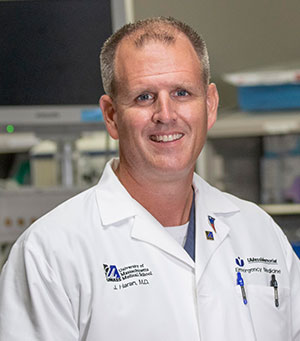
UMass Chan Medical School researchers are investigating the oral microbiome’s connection to debilitating long-term COVID-19 neurological symptoms. A study led by John P. Haran, MD, PhD, associate professor of emergency medicine and microbiology & physiological systems and clinical director of the Center for Microbiome Research at UMass Chan, involves 114 health care workers at UMass Memorial Medical Center who were vaccinated against COVID-19 prior to infection.
Most people recover from COVID-19 within two to four weeks, according to Dr. Haran. There is no strict threshold for persistent symptoms defined as long COVID, but Haran said it is generally considered to be neurological or respiratory symptoms that continue beyond 12 weeks post-infection. An estimated one in five people infected with COVID-19 report long COVID symptoms, although findings vary. Older adults are more likely to develop long COVID.
Haran’s study follows non-hospitalized patients after 12 weeks, focusing on neurological outcomes such as brain fog and fatigue. It augments previous research led by Haran and Evan S. Bradley, MD, PhD, assistant professor of emergency medicine, that found hospitalized patients with long-COVID symptoms have oral microbiomes with a significantly higher abundance of bacteria that induce inflammation.
“COVID definitely affects your immune system pretty dramatically, especially early on during the acute phases of it,” Haran said. “And your immune system is in constant balance with your gut microbiome but also your oral microbiome. If they are out of balance, different bacteria species can grow and take over and others can go down.”
He continued, “What we’re thinking is that for some people in that acute stage, certain microbiome imbalances lead to a chronic inflammatory state and that chronic inflammatory state is what drives the longer-lasting symptoms.”
Researchers who study aging and diseases such as Alzheimer’s have observed that there were spikes in new cases of dementia in the year following previous outbreaks of similar viral infections including SARS and MERS, Haran said. A study from Argentina found 60 percent of older adults who recovered from COVID went on to have persistent cognitive defects.
Studying the long-COVID connection to inflammation and the oral microbiome fits with Haran’s Alzheimer’s research. His team found that specific pathways in the gut can influence brain inflammation that occurs in Alzheimer’s disease. The oral microbiome is the first meeting place along the alimentary canal where the immune system meets the outside world.
Haran’s current study explores a similar possible connection between a pro-inflammatory response from oral microbiota leading to neurological long-COVID symptoms among a more common group of those who now get infected: working-age, generally healthy people.
Haran said that if researchers can identify what microbiota species are out of balance, there might be a treatment window during the first two to four weeks of infection to improve long-term outcomes.
In the meantime, there is no treatment for long COVID.
Haran suggested that older people in particular, who are more likely to develop long COVID as well as neurological diseases such as Alzheimer’s, follow findings coming out of research sponsored by the Alzheimer’s Association that a trifold of mind games, dietary interventions and exercise offered a strong benefit.
Related UMass Chan news stories:
Coronavirus variants explained: Conversation with John Haran
John Haran works to understand how microbiome impacts development of Alzheimer’s disease